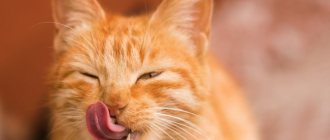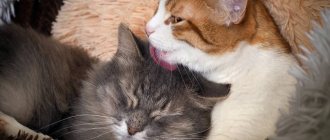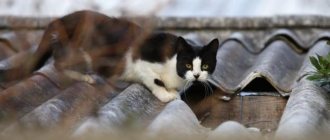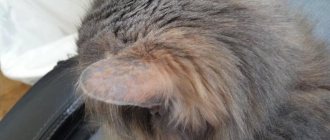Normal breath odor in cats
Cats are predators, they need to eat meat and fish, so they always give off a different aroma. But usually it is weak, arising from what has been eaten. In brachycephalic breeds, bad mouth odor is normal. The list includes Scottish, British, Persian and exotic cats. They are distinguished by the shape of the skull - in violation of the normal proportions of width and length.
As a result, their noses are short and flattened, so some of their breathing passes through the mouth. But even with a normal structure of the nasopharynx, the smell can arise due to gastric juice - in sphinxes or due to inflammation of overgrown soft gum tissue in Abyssinians and Maine Coons.
Diseases are rare in kittens, so their breath smells bad when changing teeth. During this period, excessive proliferation of bacteria occurs. The smell disappears after changing teeth to molars. Or the cause is gum injury. Until the soft tissues heal, there will be a smell from the mouth, then it goes away.
In adult healthy pets 1-8 years old, in addition to diseases, the odor is provoked by food (especially raw food), lack of oral hygiene, cheap ready-made low-quality food, or dental problems (chips, plaque, stones).
Older animals have a smelly mouth due to chronic diseases. Old pets are predisposed to squamous cell carcinoma, which is accompanied not only by a stinking mouth, but also by excessive drooling, loosening of the incisors, and the appearance of erosions. Also, as you get older, you start having problems with your teeth. If there are no diseases, then the cause is age-related, hormonal changes, ready-made food, animal food.
How to brush your cat's teeth at home
When you get yourself a tailed pet, you need to understand that this is not a toy, it needs the necessary care. This includes brushing your teeth, and this needs to be done regularly. This is especially important when the animal has a foul odor coming from its mouth. In order to brush your cat’s teeth, you don’t have to buy a special toothpaste; you can also use the regular children’s version.
It happens that animals do not allow you to approach with a brush, then it can be replaced with natural fabric of medium hardness. The brush or cloth is soaked in water, then dipped in the paste (this can be replaced with baking soda). After the pet is fixed in the required position, you need to begin the procedure. Pets' teeth are brushed in the same order as people's: from top to bottom, from side to side. This method of sanitation is necessary for your pet, so you need to teach him to brush his teeth from childhood.
Proper cat care and regular consultations with a veterinarian will help avoid the question of why the cat’s mouth smells far from fresh.
Types of unpleasant odors
There are several types of bad breath in cats. It depends on the cause of its appearance, pathology. Conversely, the type of smell helps in diagnosis.
Cat's breath smells fishy
A faint fishy aroma from a cat's mouth occurs after eating seafood due to insufficient hygiene. Or does it indicate oral pathologies. Another reason is plaque, stones, gum inflammation.
Putrid odor from cat's mouth
A rotten smell indicates many problems. The simplest reason is that ready-made food is of low quality or unsuitable for your pet. To get rid of the smell, it is enough to adjust your diet, replace food, and add vitamin supplements to it. If there are problems with the gastrointestinal tract, food is not completely processed and remains in the stomach. As a result, it decomposes, forming ammonia and hydrogen sulfide, which are released in the form of foul breath.
It stinks of rotten meat in the presence of infections, digestive pathologies (ulcers, intestinal blockage, gastritis). Therapy is prescribed depending on the disease, some require surgery. Also, a rotten smell appears due to helminthic infestation.
Cat smells of acetone from the mouth
It smells like acetone if your pet is diagnosed with diabetes. Then the body produces little insulin. As a result, the concentration of acetone and ketone bodies increases. The smell is not strong, but specific, persistent, combined with constant thirst.
Ammonia odor from cat's mouth
If ammonia is felt in the breath, this indicates impaired kidney function and kidney failure. Less urine is produced, sometimes the process stops completely. As a result, urea and creatinine accumulate. This provokes the appearance of an ammonia aroma.
Sweetish smell from cat's mouth
A sweet smell from the mouth (like the scent of rotting meat) indicates liver pathology. Disruption of its functioning worsens the filtration function, toxins begin to accumulate in the body, poisoning it. If the sweetish smell is accompanied by yellowing of the mucous membranes, your pet should be taken to the vet immediately.
Causes of bad breath in cats
Halitosis is divided into several groups based on its causes. If this is not a short-term phenomenon that occurs after feeding, then it is caused by diseases and pathological processes. Also the cause is disruption of the salivary glands. Then the food has difficulty passing through the esophagus, injuring it, causing inflammation and unpleasant breathing.
Diseases of the mouth and teeth
In kittens, halitosis usually occurs due to changing teeth. In adult pets it is caused by pathologies of the teeth and oral cavity. The root cause is often stones and plaque. The owner himself can prevent their occurrence by brushing the cat’s teeth regularly.
Cliny is available as a rinse. It is used for treatment and oral hygiene. The liquid removes plaque, stones, and unpleasant aroma. The drug is added to drinking water. It is also available in spray form, which is more convenient to use. Dental Powder is added to food.
For this purpose, you can offer kittens special toys. Pet stores sell pastes, gels, sprays, and brushes for animals. If your cat does not allow you to brush your teeth or behaves aggressively, you can temporarily switch it to hard dental food made from solid granules. If there is a large accumulation of tartar, professional laser cleaning is performed.
If the cause is a disease, the help of a veterinarian will be required. Bad breath in a cat appears against the background of gingivitis, stomatitis, and periodontitis. Also the cause is an abscess - pus in a soft tissue capsule. It is usually formed due to dirt or a foreign object getting into the wound.
A veterinarian deals with the treatment of gingivitis and stomatitis (inflammation of the soft tissues of the mouth). But you can remove odor from a cat’s mouth and alleviate its condition before visiting a doctor by rinsing with a weak solution of potassium permanganate or chamomile decoction. The ulcers are washed with Chlorophyllipt .
If an abscess is detected, the capsule is opened with sterile instruments, the pus is pumped out, washed, and the wound is disinfected. At home, you can add a decoction of horsetail and medicinal chamomile to your drink, and treat damaged tissue with Chlorhexidine and Furacilin .
Diseases of the nasopharynx
An unpleasant odor occurs due to polyps formed in the nose. They are removed surgically at a veterinary clinic. Rarely, cats can be diagnosed with sinusitis, sinusitis, and viral diseases. Then the smell is complemented by sneezing, tearing, nasal discharge, and fever. The pet needs to be taken to the vet immediately.
Problems with internal organs
Organ dysfunction is usually common in older pets. Diabetes is often the cause. It disrupts the functioning of almost all organs and systems.
Other diseases can cause bad breath:
- gastrointestinal pathologies;
- polyps;
- cysts;
- tumors;
- pneumonia;
- reverse reflux.
This is accompanied by a smell from the mouth and other negative symptoms. If halitosis lasts longer than one day, you need to take your cat to the veterinarian. When there is a strong smell, it indicates a dangerous disease. Surgery may be required.
If the cause of the smell is oncology, urgent treatment from a veterinarian is required. Any delay can cost your pet's life. In cats, squamous cell carcinoma is more commonly diagnosed, affecting the gums and then the jaw.
Liver pathology
The main function of the liver is to filter toxins produced during metabolic processes. When the functioning of the organ is disrupted, ammonia and phenols begin to accumulate. They spread along with the bloodstream throughout the body, causing severe intoxication.
Liver diseases often occur as a result of hepatotoxicosis or purulent cholangitis. At the same time, the pet smells strongly of rotting meat. The smell may also be sweet or rotten. Liver pathologies are characterized by additional specific symptoms - yellowing of the mucous membranes, gums, and smelly feces. The cat loses her appetite, but drinks as usual.
Treatment at home - only with the help of drugs in the dosage prescribed by the veterinarian. The selection of medications depends on the disease, its stage, the degree of liver damage, and the individual characteristics of the pet (age, weight).
Gastrointestinal disorders
Disorders of the gastrointestinal tract can occur in any area. When food passes through the esophagus, it damages the mucous membranes, lingers in the stomach, and injures the intestines. Weakened sphincters allow gastric juice into the esophagus, causing ulcers. Any gastrointestinal disease is often accompanied by the smell of fish and rot from the mouth.
In this case, you need to change your diet, eliminate harmful foods, and switch to special food. If this does not help, show it to the vet. The same must be done without delay when additional symptoms appear in the form of bloody stool, fever, and vomiting. Treatment is prescribed depending on the pathology, age, and weight of the pet.
Diabetes
In diabetes, the mouth stinks of sweetness or acetone. This is a systemic disease that develops gradually due to disruption of the endocrine system. The body decreases the production of insulin, which is necessary to maintain normal blood glucose concentrations.
The cat drinks a lot, maintains a good appetite, and often goes to the toilet to pee. You cannot cure your pet on your own. It is necessary to consult a veterinarian and prescribe insulin. Medicines prescribed for people are not suitable for animals. If you have the skills, then the injections can be done at home - in a certain dosage according to the schedule.
Worm infestation
An unpleasant odor can cause infestation with worms. Their initial habitat is the digestive system. Parasites leave traces of their vital activity, some die, decompose, and a stench comes out of the mouth. Infection with worms can occur due to eating fresh fish, meat, or contact with unwashed street shoes that carried larvae.
When infected with worms, the stomach, intestines or liver are most often affected. Worm larvae spread through the bloodstream, so they can even affect the heart and lungs. Worms produce a lot of waste products that poison the body. Then the animal’s mouth smells unpleasantly of rot.
Additional symptoms of parasite infection:
- constant sneezing;
- intestinal blockage;
- stool disorder;
- excessive appetite;
- vomit;
- bloating.
A visit to the veterinarian is not necessary. You can buy a tablet and, choosing the dosage according to the instructions, feed it to your cat. Usually one time is enough, but to be on the safe side, deworming should be repeated after 2 weeks. If the helminthic infestation is already in an advanced stage or the medicine does not help, immediately contact a veterinarian.
Kidney disease
Kidney failure is accompanied by a foul odor from the mouth. Additional signs also indicate problems - constant thirst, frequent urge to go to the toilet. The pet does not allow you to touch its stomach or sides. The cause of kidney failure is poor quality food, poor nutrition, infections, and hypothermia.
Treatment is more effective at the initial stage of the disease, when odor appears from the mouth. If additional symptoms appear and intensify, maintenance therapy may be required for the rest of the pet's life. Additionally, he is put on a special diet.
Suppuration
A putrid odor appears due to ulcers, especially those that have opened. They are formed due to injuries, inflammation, and dirt getting into the wounds. Suppuration accompanies pulpitis, damage to the mucous membranes, and caries. If the abscess is in a visible place, it is pierced and washed with Furacilin , Chlorhexidine .
These procedures can be performed independently several times a day. If the abscess is in an inaccessible place or is very advanced, the help of a veterinarian will be required. Then additional antibiotics are prescribed. Only a veterinarian can select a drug based on the weight, age, gender of the pet, character and area of suppuration.
Brown discharge
When your pet’s breath smells bad and brown discharge comes out of its mouth at the same time, then it urgently needs to be taken to the veterinarian. First rule out injuries. Dark, brown discharge may be caked blood or ichor. In the absence of injuries, calcivirosis can cause them. The virus provokes the formation of bleeding ulcers, the smell of rot from the mouth, and brown discharge.
Excessive drooling
Excessive drooling often causes stomatitis. Then you need to see if there are any ulcers in the mouth. The cause of the smell is gingivitis and calcivirosis. Treatment is prescribed by a veterinarian. Therapy includes treating damaged areas with disinfectants; severe inflammation may require antibiotics.
Prevention and oral hygiene
Pets' breath smells like garbage due to poor oral hygiene or dental problems. To prevent this, they need to be given solid food and special bones to clean their teeth.
Kittens develop bad breath when they change their teeth. Oral hygiene is especially important during this period. Need rinsing 2-3 times a day. This will prevent bacteria from multiplying. The mouths of adult pets can be treated with tablets and rinses; sprays are more suitable for the elderly.
If a kitten has bad breath, then you need to teach him to brush his teeth from childhood. Periodically give special bones and cookies from the pet store, solid food. Plaque can be removed on your own. Special brushes and wipes are sold for this. It is necessary to show the animal to the veterinarian annually as a preventative measure.
In order to avoid the situation leading to the appearance of worms, it is enough to deworm domestic cats (if they do not have access to the street) 2 times a year, and once a quarter for walking cats. The medicine is given even if no parasites or larvae are visible in the stool. Deworming is carried out 2 weeks before the annual vaccination, otherwise the vaccination may become useless due to the presence of worms in the body.
A barely perceptible, short-term unpleasant odor is often normal. But when it intensifies and lasts for a long time, it indicates pathological processes or diseases. To avoid serious consequences, you need to take your pet to the veterinarian.
Your British cat is not vaccinated
Another common cause of odor, even odors that aren't bad but are noticeably different from your cat's, can be caused by infections and diseases that can be prevented with vaccines.
Unfortunately, cats are very vulnerable to many of the diseases for which they are vaccinated. If your cat is not vaccinated, there is a good chance that she will contract one of these infections at some point.
If your cat is not vaccinated and you notice a change in her smell, it is very important to take her to the vet. This way, the vet can check and make sure they don't have an infection and begin treatment sooner if they do become infected with something.











